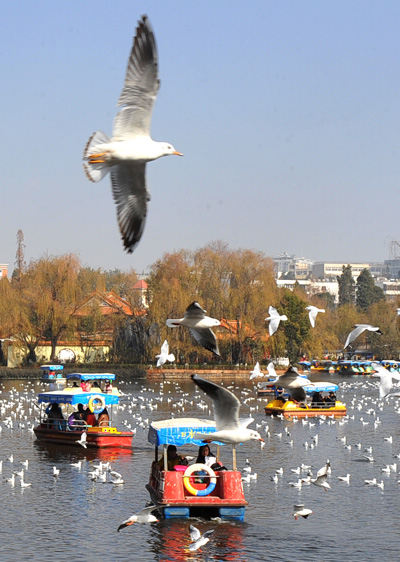|
 |
|
MIGRATORY RESIDENT Seagulls fly over a lake in Cuihu Park in Kunming, southwest China's Yunnan Province, on January 1, 2013. More than 35,000 seagulls from Siberia will spend the winter in Kunming this year (CHEN HAINING) |
Disaster Warnings
China is leading a cooperative effort to set up a tsunami and hurricane warning system in the South China Sea, according to the State Oceanic Administration (SOA).
"Tsunamis don't occur frequently, but they always result in significant damage. In the South China Sea, earthquakes and tsunamis in the Manila Trench near the Philippines are a real possibility," said Zhang Zhanhai, head of the SOA's International Cooperation Department, at a press conference on December 27, 2012.
Zhang said that China is capable of sending tsunami warnings to other countries around the South China Sea, adding that these countries have reached a consensus on China leading the establishment of the warning system.
The move came after the SOA released an international cooperation framework for the South China Sea and other neighboring sea areas in January 2012.
The framework included plans for China to cooperate with neighboring countries to explore and utilize maritime resources, reduce oceanic disasters and develop the maritime economy.
Water Investment
China spent a record 430.3 billion yuan ($69 billion) to improve water utilities in 2012, said Minister of Water Resources Chen Lei on December 28, 2012.
Investment in water conservation amounted to 775.5 billion yuan ($124 billion) in 2011 and 2012, surpassing the amount invested during the 11th Five-Year Plan period (2006-10), according to Chen.
"In 2012, China reinforced 5,400 small reservoirs and harnessed critical stretches of 2,209 small and medium-sized rivers, bringing death tolls from floods down by 50 percent," Chen said.
The government aims to build dams and levees on more than 5,000 rivers by 2015 and speed up the construction of early warning systems for floods and storm tides, according to a 2011 Central Government statement.
The government plans to double annual spending on water conservation during the 2011-20 period. In 2010, 200 billion yuan ($32 billion) was invested.
Curbing Fraud
A regulation aimed at punishing academic fraud took effect on January 1, 2013. The regulation specifies buying, selling or organizing the trade of academic degree theses as fraudulent behavior subject to punishment in addition to plagiarism and fabricating data.
According to the regulation, colleges shall revoke degrees and ban applicants from postgraduate study for three years if they plagiarize or commit fraud in their undergraduate theses. | 